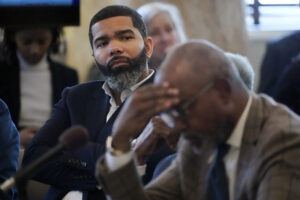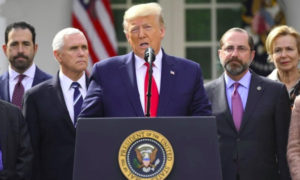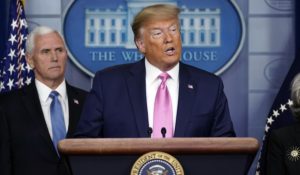Trump’s New Travel Ban Adds Non-Muslim Countries
The new order, covering more countries, constrains U.S. travel rights for citizens of Chad, Iran, Libya, North Korea, Somalia, Syria, Venezuela and Yemen. Getty Images
Getty Images
President Trump on Sunday issued a proclamation expanding his travel ban. The new order prohibits almost all travel to the U.S. for citizens of eight countries. It goes into effect Oct. 18 and constrains U.S. travel rights for citizens of Chad, Iran, Libya, North Korea, Somalia, Syria, Venezuela and Yemen. President Trump signed the proclamation the day his previous travel ban was set to expire.
Trump’s earlier travel ban covered Iran, Libya, Somalia, Sudan, Syria and Yemen, all Muslim countries. Sudan is off the new list. The eight countries in the new document include the remaining five from the old list and adds Chad, a majority-Muslim country, and North Korea and Venezuela, which do not have big Muslim populations.
The restrictions range from an indefinite ban on visas for citizens of countries like Syria to more targeted restrictions. A suspension of non-immigrant visas to citizens for Venezuela, for instance, will apply only to certain government officials and their immediate families.
… To limit confusion, valid visas would not be revoked as a result of the proclamation. The order also permits, but does not guarantee, case-by-case waivers for citizens of the affected countries who meet certain criteria.
That includes: having previously worked or studied in the U.S.; having previously established “significant contacts” in the U.S.; and having “significant business or professional obligations” in the U.S. Still, officials acknowledged the waiver restrictions were narrower than the exemptions for people with bona fide ties to the United States that the Supreme Court mandated before the expiring order went into effect in late June.
The president insinuated in early September that the travel ban might be expanded. Following two tweets in which he cited a terrorist attack in London, he tweeted: “The travel ban into the United States should be far larger, tougher and more specific—but stupidly, that would not be politically correct!”
Unlike previous iterations of the travel ban, this order is written to stay in effect indefinitely. Officials told The Washington Post that it will be “phased in” over time. The Post offered insight on the potential legal issues the ban will face:
Critics of the administration have argued that the travel bans are an unconstitutional attempt to deliver on Trump’s campaign promise of “a total and complete shutdown of Muslims entering the United States.” Administration officials deny that any of the bans were aimed at Muslims, saying they are based on security concerns about visitors from countries with failing or weak governments.
“The restrictions either previously or now were never, ever ever based on race, religion or creed,’’ one senior administration official said. “Those governments are simply not compliant with our basic security requirements.”
Anthony Romero, executive director of the American Civil Liberties Union, said adding North Korea and Venezuela to the administration’s list does not fix the travel ban’s core problem.
“President Trump’s original sin of targeting Muslims,” he said, “cannot be cured by throwing other countries onto his enemies list.”
The Trump administration is not releasing its full justification for each country’s travel restriction. The proclamation reads, “Describing all of those reasons publicly, however, would cause serious damage to the national security of the United States, and many such descriptions are classified.” However, Trump’s presidential campaign called for “total and complete shutdown of Muslims entering the United States,” and less than two weeks after taking office, he signed an order flatly banning citizens from seven Muslim-majority countries from entering the country (two versions of this bill were blocked, the first by several courts and the second by a federal judge).
The Supreme Court then ruled that certain components of the ban could take effect, and again ruled in the Trump administration’s favor in September, allowing the order’s ban on refugees to take effect.
But the Supreme Court has not yet issued a full ruling on the constitutionality of the ban. It was scheduled to hear oral arguments on Oct. 10, eight days before the latest edition of the travel ban was scheduled to take effect, but cancelled those hearings. As The New York Times states:
By canceling the arguments for now, the court signaled that it may never decide the case. “The cases are removed from the oral argument calendar, pending further order of the court,” the court said.
If the court does eventually dismiss the case as moot, a further legal question will remain. The Trump administration will ask the court to vacate the appeals court decisions striking down the earlier ban, while the challengers will ask that the decisions remain on the books.
The New York Times says that President Trump’s latest order is likely to start a third round of litigation, which may also reach the Supreme Court.
Your support matters…
Independent journalism is under threat and overshadowed by heavily funded mainstream media.
You can help level the playing field. Become a member.
Your tax-deductible contribution keeps us digging beneath the headlines to give you thought-provoking, investigative reporting and analysis that unearths what's really happening- without compromise.
Give today to support our courageous, independent journalists.






You need to be a supporter to comment.
There are currently no responses to this article.
Be the first to respond.